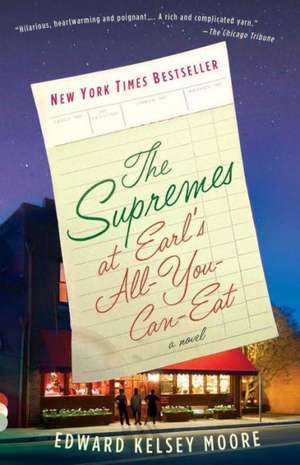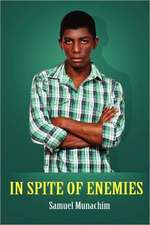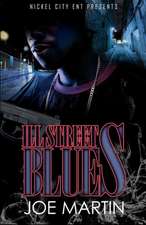The Supremes at Earl's All-You-Can-Eat: Vintage Contemporaries
Autor Edward Kelsey Mooreen Limba Engleză Paperback – 3 feb 2014
Vezi toate premiile Carte premiată
Earl’s All-You-Can-Eat is home away from home for this inseparable Plainview, Indiana, trio. Dubbed “the Supremes” by high school pals in the tumultuous 1960s, they weather life’s storms together for the next four decades. Now, during their most challenging year yet, dutiful, proud, and talented Clarice must struggle to keep up appearances as she deals with her husband’s humiliating infidelities. Beautiful, fragile Barbara Jean is rocked by the tragic reverberations of a youthful love affair. And fearless Odette engages in the most terrifying battle of her life while contending with the idea that she has inherited more than her broad frame from her notorious pot-smoking mother, Dora.
Through marriage, children, happiness, and the blues, these strong, funny women gather each Sundayat the same table at Earl’s diner for delicious food, juicy gossip, occasional tears, and uproarious banter.
With wit and love, style and sublime talent, Edward Kelsey Moore brings together four intertwined love stories, three devoted allies, and two sprightly earthbound spirits in a big-hearted debut novel that embraces the lives of people you will never forget.
From the Hardcover edition.
| Toate formatele și edițiile | Preț | Express |
|---|---|---|
| Paperback (2) | 50.75 lei 3-5 săpt. | +28.16 lei 6-12 zile |
| Hodder & Stoughton – 30 ian 2014 | 50.75 lei 3-5 săpt. | +28.16 lei 6-12 zile |
| Vintage Publishing – 3 feb 2014 | 98.78 lei 3-5 săpt. |
Din seria Vintage Contemporaries
-
 Preț: 109.95 lei
Preț: 109.95 lei -
 Preț: 101.80 lei
Preț: 101.80 lei -
 Preț: 119.87 lei
Preț: 119.87 lei -
 Preț: 107.46 lei
Preț: 107.46 lei -
 Preț: 91.77 lei
Preț: 91.77 lei -
 Preț: 132.88 lei
Preț: 132.88 lei -
 Preț: 111.51 lei
Preț: 111.51 lei -
 Preț: 96.52 lei
Preț: 96.52 lei -
 Preț: 105.82 lei
Preț: 105.82 lei -
 Preț: 111.76 lei
Preț: 111.76 lei -
 Preț: 111.92 lei
Preț: 111.92 lei -
 Preț: 117.87 lei
Preț: 117.87 lei -
 Preț: 115.94 lei
Preț: 115.94 lei -
 Preț: 113.56 lei
Preț: 113.56 lei -
 Preț: 100.35 lei
Preț: 100.35 lei -
 Preț: 108.09 lei
Preț: 108.09 lei -
 Preț: 115.42 lei
Preț: 115.42 lei -
 Preț: 106.04 lei
Preț: 106.04 lei -
 Preț: 87.84 lei
Preț: 87.84 lei -
 Preț: 90.64 lei
Preț: 90.64 lei -
 Preț: 97.15 lei
Preț: 97.15 lei -
 Preț: 99.60 lei
Preț: 99.60 lei -
 Preț: 96.93 lei
Preț: 96.93 lei -
 Preț: 99.30 lei
Preț: 99.30 lei -
 Preț: 125.21 lei
Preț: 125.21 lei -
 Preț: 103.74 lei
Preț: 103.74 lei -
 Preț: 100.98 lei
Preț: 100.98 lei -
 Preț: 100.76 lei
Preț: 100.76 lei -
 Preț: 89.09 lei
Preț: 89.09 lei -
 Preț: 96.93 lei
Preț: 96.93 lei -
 Preț: 101.24 lei
Preț: 101.24 lei -
 Preț: 125.13 lei
Preț: 125.13 lei -
 Preț: 89.50 lei
Preț: 89.50 lei -
 Preț: 101.58 lei
Preț: 101.58 lei -
 Preț: 139.63 lei
Preț: 139.63 lei -
 Preț: 90.35 lei
Preț: 90.35 lei -
 Preț: 106.45 lei
Preț: 106.45 lei -
 Preț: 101.88 lei
Preț: 101.88 lei -
 Preț: 107.92 lei
Preț: 107.92 lei -
 Preț: 77.02 lei
Preț: 77.02 lei -
 Preț: 97.34 lei
Preț: 97.34 lei -
 Preț: 101.17 lei
Preț: 101.17 lei -
 Preț: 112.11 lei
Preț: 112.11 lei -
 Preț: 83.94 lei
Preț: 83.94 lei -
 Preț: 95.92 lei
Preț: 95.92 lei -
 Preț: 123.90 lei
Preț: 123.90 lei -
 Preț: 106.04 lei
Preț: 106.04 lei -
 Preț: 105.41 lei
Preț: 105.41 lei -
 Preț: 100.57 lei
Preț: 100.57 lei -
 Preț: 99.75 lei
Preț: 99.75 lei
Preț: 98.78 lei
Nou
Puncte Express: 148
Preț estimativ în valută:
18.90€ • 19.57$ • 15.98£
18.90€ • 19.57$ • 15.98£
Carte disponibilă
Livrare economică 13-27 februarie
Preluare comenzi: 021 569.72.76
Specificații
ISBN-13: 9780307950437
ISBN-10: 0307950433
Pagini: 384
Dimensiuni: 130 x 201 x 25 mm
Greutate: 0.3 kg
Editura: Vintage Publishing
Seria Vintage Contemporaries
ISBN-10: 0307950433
Pagini: 384
Dimensiuni: 130 x 201 x 25 mm
Greutate: 0.3 kg
Editura: Vintage Publishing
Seria Vintage Contemporaries
Recenzii
"Edward Kelsey Moore has written a novel jam-packed with warmth, honesty, wit, travail, and just enough madcap humor to keep us giddily off-balance. It teems with memorable characters, chief among them Odette, as unlikely and irresistible protagonist as we are likely to meet. The Supremes at Earl's All-You-Can-Eat is that rare and happy find: a book that delivers not only good story, but good company." —Leah Hager Cohen, author of The Grief of Others
"What a delight and a privilege it is to be among the earliest readers of this breathtaking debut. The supremely gifted, supremely entertaining, and supremely big-hearted Edward Kelsey Moore has conjured up the story of an entire community and, at its sparkling center, a trio of memorable heroines. How I long to have Odette, Clarice, and Barbara Jean on speed-dial! At least I'll be able to brag that I knew them before they hit the big time . . . as I can promise you they will." —Julia Glass, author of Three Junes and The Widower’s Tale
“Funny and tenderhearted. . . Moore expertly combines tragedy and comedy in a way that feels fluid and natural, creating a world that is internally consistent and rich. . . . Perhaps the most remarkable quality of The Supremes is love—the author’s love for his characters, even the most flawed, shines from every page.” —Ilana Teitelbaum, Shelf Awareness
“Edward Kelsey Moore knows how to write a terrific, complex, believable, and always intriguing story.” —Zetta Brown, The New York Journal of Books
“A book that deserves to be read in its enchanting entirety before the inevitable movie deal comes to pass.” —Stevie Godson, The New York Journal of Books
“Moore is a demonstrative storyteller and credits youthful eavesdropping for inspiring this multifaceted novel. Comparisons to The Help and Fried Green Tomatoes at the Whistle Stop Cafe are inevitable, but Moore’s take on this rowdy troupe of outspoken, lovable women has its own distinctive pluck.” —Publishers Weekly
“A gripping novel that weaves together the lives of three remarkable women, and does so with flair, wit, and tremendous heart.” —Carolina De Robertis, author of Perla and The Invisible Mountain
“The author uses warmhearted humor and salty language to bring to life a tight-knit African-American community. . . . With salt-of-the-earth characters like fearless Odette, motherless Barbara Jean, and sharp-tongued Clarice, along with an event-filled plot that readers will laugh and cry over, this is a good bet to become a best seller.” —Library Journal
Throughout the Supremes’ intertwined stories is one constant—meeting and eating at Earl’s All-You-Can-Eat, a place where relationships are forged, scandals are aired and copious amounts of chicken are consumed. . . . A novel of strong women, evocative memories and deep friendship.” —Kirkus
Edward Kelsey Moore’s The Supremes at Earl’s All-You-Can-Eat had me nodding in recognition and laughing out loud when I wasn’t crying. His delightful voice really rings true, bringing the unforgettable Odette, Clarice and Barbara Jean to vivid life on every page.—Connie Briscoe, author of Money Can’t Buy Me Love
“The Supremes at Earl’s-All-You-Can-Eat is a scrumptious delight! I can’t wait for my old friends to get to know my new friends: Odette, Barbara Jean, and Clarice (not to mention Odette’s pot-smoking mama and her friend Mrs. Roosevelt!).” ߝ Carleen Brice, author of Orange Mint and Honey and Children of the Waters
“I am always a little suspicious of a male writer speaking for female characters, but Moore inhabits and enlarges the experience he creates so delightfully. A real triumph for a brilliant new novelist.” —Suzanne Levine, author of How We Love Now: Women Talk About Intimacy after Fifty
"What a delight and a privilege it is to be among the earliest readers of this breathtaking debut. The supremely gifted, supremely entertaining, and supremely big-hearted Edward Kelsey Moore has conjured up the story of an entire community and, at its sparkling center, a trio of memorable heroines. How I long to have Odette, Clarice, and Barbara Jean on speed-dial! At least I'll be able to brag that I knew them before they hit the big time . . . as I can promise you they will." —Julia Glass, author of Three Junes and The Widower’s Tale
“Funny and tenderhearted. . . Moore expertly combines tragedy and comedy in a way that feels fluid and natural, creating a world that is internally consistent and rich. . . . Perhaps the most remarkable quality of The Supremes is love—the author’s love for his characters, even the most flawed, shines from every page.” —Ilana Teitelbaum, Shelf Awareness
“Edward Kelsey Moore knows how to write a terrific, complex, believable, and always intriguing story.” —Zetta Brown, The New York Journal of Books
“A book that deserves to be read in its enchanting entirety before the inevitable movie deal comes to pass.” —Stevie Godson, The New York Journal of Books
“Moore is a demonstrative storyteller and credits youthful eavesdropping for inspiring this multifaceted novel. Comparisons to The Help and Fried Green Tomatoes at the Whistle Stop Cafe are inevitable, but Moore’s take on this rowdy troupe of outspoken, lovable women has its own distinctive pluck.” —Publishers Weekly
“A gripping novel that weaves together the lives of three remarkable women, and does so with flair, wit, and tremendous heart.” —Carolina De Robertis, author of Perla and The Invisible Mountain
“The author uses warmhearted humor and salty language to bring to life a tight-knit African-American community. . . . With salt-of-the-earth characters like fearless Odette, motherless Barbara Jean, and sharp-tongued Clarice, along with an event-filled plot that readers will laugh and cry over, this is a good bet to become a best seller.” —Library Journal
Throughout the Supremes’ intertwined stories is one constant—meeting and eating at Earl’s All-You-Can-Eat, a place where relationships are forged, scandals are aired and copious amounts of chicken are consumed. . . . A novel of strong women, evocative memories and deep friendship.” —Kirkus
Edward Kelsey Moore’s The Supremes at Earl’s All-You-Can-Eat had me nodding in recognition and laughing out loud when I wasn’t crying. His delightful voice really rings true, bringing the unforgettable Odette, Clarice and Barbara Jean to vivid life on every page.—Connie Briscoe, author of Money Can’t Buy Me Love
“The Supremes at Earl’s-All-You-Can-Eat is a scrumptious delight! I can’t wait for my old friends to get to know my new friends: Odette, Barbara Jean, and Clarice (not to mention Odette’s pot-smoking mama and her friend Mrs. Roosevelt!).” ߝ Carleen Brice, author of Orange Mint and Honey and Children of the Waters
“I am always a little suspicious of a male writer speaking for female characters, but Moore inhabits and enlarges the experience he creates so delightfully. A real triumph for a brilliant new novelist.” —Suzanne Levine, author of How We Love Now: Women Talk About Intimacy after Fifty
Notă biografică
Edward Kelsey Moore lives in Chicago, where he has enjoyed a long career as a cellist. His short fiction has appeared in several literary magazines, including Indiana Review, African American Review, and Inkwell. His short story “Grandma and the Elusive Fifth Crucifix” was selected as an audience favorite on National Public Radio’s Stories on Stage series.
Extras
Chapter 1
I woke up hot that morning. Came out of a sound sleep with my face tingling and my nightgown stuck to my body. Third time that week. The clock on the dresser on the other side of the bedroom glowed 4:45, and I could hear the hiss of the air conditioner and feel its breeze across my face. I had set the temperature to sixty before going to sleep. So common sense said that it had to be chilly in the room. Well, common sense and the fact that my husband, James, who lay snoring beside me, was outfitted for winter even though it was mid-July. He slept like a child—a six-foot, bald-headed, middle-aged child—wrapped in a cocoon he had fashioned for himself out of the sheet and blanket I had kicked off during the night. Just the top of his brown head was visible above the floral pattern of the linens. Still, every inch of me was screaming that the room was a hundred degrees.
I lifted my nightgown and let it fall, trying to fan cool air onto my skin. That accomplished nothing. My friend Clarice claimed that meditation and positive thinking eased her path through menopause, and she was forever after me to try it. So I lay still in the predawn darkness and thought cool thoughts. I summoned up an old summer memory of hopping with the kids through the cold water jetting from the clicking yellow sprinkler in our backyard. I pictured the ice that formed every winter on the creek that ran behind Mama and Daddy’s house in Leaning Tree, making it look like it was wrapped up in cellophane.
I thought of my father, Wilbur Jackson. My earliest recollection of him is the delicious chill I got as a little girl whenever Daddy scooped me up in his arms after walking home on winter evenings from the carpentry shop he owned. I recalled how cold radiated from Daddy’s coveralls and the way it felt to run my hands over the frost--coated hair of his beard.
But Daddy’s shop had been gone for ages. The Leaning Tree property, creek and all, had been the domain of various renters for half a decade. And my children were each at least twenty years beyond dancing in the spray of a sprinkler.
No thoughts, at least not the ones I came up with, proved capable of icing down my burning skin. So I cussed Clarice for her bad advice and for making me think of the old days—a certain recipe for sleeplessness—and I decided to head for the kitchen. There was a pitcher of water in the Frigidaire and butter pecan ice cream in the freezer. I figured a treat would set me right.
I sat up in the bed, careful not to wake James. Normally, he was as easygoing a man as you’d ever meet. But if I woke him before dawn on a Sunday, he would look at me sideways all through morning service and right up until dinner. So, in order not to disturb him, I moved in slow motion as I stood, slipped my feet into my house shoes, and made my way to the bedroom door in the dark.
Even though I had made the trip from our bed to the kitchen thousands of times in pitch blackness, what with sick children and countless other nighttime emergencies during the decades of our marriage, and even though not a stick of furniture in our bedroom had been moved in twenty years, I rammed the little toe of my right foot into the corner of our old mahogany dresser not five steps into my journey. I cussed again, out loud this time. I looked over my shoulder to see if I had awakened James, but he was still snoring away in his linen wrappings. Hot and tired, my toe throbbing in my green terrycloth slip-ons, I had to fight the urge to run and wake James and insist that he sit up and suffer along with me. But I was good and continued to creep out of the room.
Other than the faint growl of James snoring three rooms away, the only sound in the kitchen was the bass whoosh made by the lopsided ceiling fan churning above my head. I turned on the kitchen light and looked up at that fan wobbling on its axis. With my toe smarting, and still longing to distribute my bad humor, I decided that even if I couldn’t justify snapping at James about my hot flash or my sore toe, I could surely rationalize letting off some steam by yelling at him for improperly installing that fan eighteen years earlier. But, like my desire to wake him and demand empathy, I successfully fought off this temptation.
I opened the refrigerator door to get the water pitcher and decided to stick my head inside. I was in almost to my shoulders, enjoying the frosty temperature, when I got the giggles thinking how someone coming upon me, head stuffed into the refrigerator instead of the oven, would say, “Now there’s a fat woman who is completely clueless about how a proper kitchen suicide works.”
I grabbed the water pitcher and saw a bowl of grapes sitting next to it looking cool and delicious. I pulled the bowl out with the pitcher and set them on the kitchen table. Then I fetched a glass from the dish drainer and brought it to the table, kicking my house shoes off along the way in order to enjoy the feel of cold linoleum against the soles of my bare feet. I sat down at what had been my place at the table for three decades and poured a glass of water. Then I popped a handful of grapes into my mouth and started to feel better.
I loved that time of day, that time just before sunrise. Now that Jimmy, Eric, and Denise were all grown and out of the house, the early hours of the day were no longer linked to slow-passing minutes listening for coughs or cries or, later, teenage feet sneaking in or out of the house. I was free to appreciate the quiet and the way the
yellowish-gray light of the rising sun entered the room, turning everything from black and white to color. The journey from Kansas to Oz right in my own kitchen.
That morning, when the daylight came it brought along a visitor, Dora Jackson. I clapped my hand over my mouth to stifle a squeak of surprise when I first caught sight of my mother strolling into the room. She came from the direction of the back door, her short, wide body waddling with an uneven stride from having her left leg badly set by a country doctor when she was a girl.
People used to call us “the twins,” Mama and me. The two of us are round women—big in the chest, thick around the waist, and wide across the hips. We share what has often been charitably called an “interesting” face—narrow eyes, jowly cheeks, broad forehead, big but perfect teeth. I grew to be a few inches taller, five foot three. But if you were to look at pictures of us, you’d swear we were the same woman at different ages.
My mother loved the way she looked. She would strut through town on her uneven legs with her big breasts pointing the way forward, and you knew from looking at her that she figured she was just about the hottest thing going. I never came to love my tube-shaped body the way Mama loved hers, but learning to imitate that confident stride of hers was probably the single smartest thing I ever did.
Mama wore her best dress that Sunday morning, the one she usually brought out only for summer weddings and Easter. It was light blue with delicate yellow flowers and green vines embroidered around the collar and the cuffs of the short sleeves. Her hair was pulled up, the way she wore it for special occasions. She sat down across from me at the table and smiled.
Mama gestured with her hand toward the bowl of grapes on the table and said, “Are you outta ice cream, Odette?”
“I’m trying to eat healthier, maybe take off a few pounds this summer,” I lied, not wanting to admit that I was thinking of the grapes as a first course.
Mama said, “Dietin’ is a waste of energy. Nothin’ wrong with having a few extra pounds on you. And you really shouldn’t drink so much water at this time of day. You were a bedwetter.”
I smiled and, in a childish show of independence, drank more water. Then I tried to change the subject. I asked, “What brings you by, Mama?”
“I just thought I’d come tell you about the fun I had with Earl and Thelma McIntyre. We was up all night goin’ over old times and just laughin’ up a storm. I had forgot just how funny Thelma was. Lord, that was a good time. And that Thelma can roll a joint like nobody’s business, tight little sticks with just enough slack in the roach. I told her—”
“Mama, please,” I interrupted. I looked over my shoulder the way I always did when she started talking about that stuff. My mother had been a dedicated marijuana smoker all of her adult life. She said it was for her glaucoma. And if you reminded her that she’d never had glaucoma, she would bend your ear about the virtues of her preventative vision care regimen.
Other than being against the law, the problem with Mama’s habit, and the reason I automatically glanced over my shoulder when she started talking about that mess, was that James had worked for the Indiana State Police for thirty-five years. Mama got caught twenty years back buying a bag of dope on the state university campus on the north end of town, and as a favor to James, the head of campus security brought her home instead of arresting her. The campus security chief swore he’d keep it under wraps, but things like that never stay quiet in a little town like Plainview. Everybody knew about it by the next morning. It tickled Mama to no end when her getting busted became a sermon topic at church a week later. But James didn’t see the humor in it when it happened, and he never would.
I was eager for Mama to get back on track with the story of her evening with the McIntyres, skipping any illegal parts, because foremost among my mother’s many peculiarities was the fact that, for many years, the vast majority of her conversations had been with dead people. Thelma McIntyre, the excellent joint roller, had been dead for twenty-some years. Big Earl, on the other hand, had been just fine one day earlier when I’d seen him at Earl’s All-You-Can-Eat buffet. If he had indeed been visiting with Mama, it was not good news for Big Earl.
“So, Big Earl’s dead, is he?” I asked.
“I imagine so,” she said.
I sat there for a while, not saying anything, just thinking about Big Earl gone from the earth. Mama gazed at me like she was reading my mind and said, “It’s all right, baby. Really. He couldn’t be happier.”
We found out about Mama seeing ghosts at a Thanksgiving supper back in the 1970s. Mama, Daddy, my big brother Rudy, James, Jimmy, Eric, and me—I was pregnant with Denise that fall—were all gathered around the table. In keeping with tradition, I had done all of the cooking. Flowers Mama understood. She had the best garden in town, even before she devoted a plot to her prized marijuana plants. Food Mama never quite got the hang of. The last time Mama attempted to cook a holiday meal, we ended up feeding her black-and-gray glazed ham to the dog and dining on hardboiled eggs. The dog took one bite of Mama’s ham and howled for six hours straight. The poor animal never quite recovered. So I became the family chef at age ten and we ended up with the only vegetarian dog in southern Indiana.
I woke up hot that morning. Came out of a sound sleep with my face tingling and my nightgown stuck to my body. Third time that week. The clock on the dresser on the other side of the bedroom glowed 4:45, and I could hear the hiss of the air conditioner and feel its breeze across my face. I had set the temperature to sixty before going to sleep. So common sense said that it had to be chilly in the room. Well, common sense and the fact that my husband, James, who lay snoring beside me, was outfitted for winter even though it was mid-July. He slept like a child—a six-foot, bald-headed, middle-aged child—wrapped in a cocoon he had fashioned for himself out of the sheet and blanket I had kicked off during the night. Just the top of his brown head was visible above the floral pattern of the linens. Still, every inch of me was screaming that the room was a hundred degrees.
I lifted my nightgown and let it fall, trying to fan cool air onto my skin. That accomplished nothing. My friend Clarice claimed that meditation and positive thinking eased her path through menopause, and she was forever after me to try it. So I lay still in the predawn darkness and thought cool thoughts. I summoned up an old summer memory of hopping with the kids through the cold water jetting from the clicking yellow sprinkler in our backyard. I pictured the ice that formed every winter on the creek that ran behind Mama and Daddy’s house in Leaning Tree, making it look like it was wrapped up in cellophane.
I thought of my father, Wilbur Jackson. My earliest recollection of him is the delicious chill I got as a little girl whenever Daddy scooped me up in his arms after walking home on winter evenings from the carpentry shop he owned. I recalled how cold radiated from Daddy’s coveralls and the way it felt to run my hands over the frost--coated hair of his beard.
But Daddy’s shop had been gone for ages. The Leaning Tree property, creek and all, had been the domain of various renters for half a decade. And my children were each at least twenty years beyond dancing in the spray of a sprinkler.
No thoughts, at least not the ones I came up with, proved capable of icing down my burning skin. So I cussed Clarice for her bad advice and for making me think of the old days—a certain recipe for sleeplessness—and I decided to head for the kitchen. There was a pitcher of water in the Frigidaire and butter pecan ice cream in the freezer. I figured a treat would set me right.
I sat up in the bed, careful not to wake James. Normally, he was as easygoing a man as you’d ever meet. But if I woke him before dawn on a Sunday, he would look at me sideways all through morning service and right up until dinner. So, in order not to disturb him, I moved in slow motion as I stood, slipped my feet into my house shoes, and made my way to the bedroom door in the dark.
Even though I had made the trip from our bed to the kitchen thousands of times in pitch blackness, what with sick children and countless other nighttime emergencies during the decades of our marriage, and even though not a stick of furniture in our bedroom had been moved in twenty years, I rammed the little toe of my right foot into the corner of our old mahogany dresser not five steps into my journey. I cussed again, out loud this time. I looked over my shoulder to see if I had awakened James, but he was still snoring away in his linen wrappings. Hot and tired, my toe throbbing in my green terrycloth slip-ons, I had to fight the urge to run and wake James and insist that he sit up and suffer along with me. But I was good and continued to creep out of the room.
Other than the faint growl of James snoring three rooms away, the only sound in the kitchen was the bass whoosh made by the lopsided ceiling fan churning above my head. I turned on the kitchen light and looked up at that fan wobbling on its axis. With my toe smarting, and still longing to distribute my bad humor, I decided that even if I couldn’t justify snapping at James about my hot flash or my sore toe, I could surely rationalize letting off some steam by yelling at him for improperly installing that fan eighteen years earlier. But, like my desire to wake him and demand empathy, I successfully fought off this temptation.
I opened the refrigerator door to get the water pitcher and decided to stick my head inside. I was in almost to my shoulders, enjoying the frosty temperature, when I got the giggles thinking how someone coming upon me, head stuffed into the refrigerator instead of the oven, would say, “Now there’s a fat woman who is completely clueless about how a proper kitchen suicide works.”
I grabbed the water pitcher and saw a bowl of grapes sitting next to it looking cool and delicious. I pulled the bowl out with the pitcher and set them on the kitchen table. Then I fetched a glass from the dish drainer and brought it to the table, kicking my house shoes off along the way in order to enjoy the feel of cold linoleum against the soles of my bare feet. I sat down at what had been my place at the table for three decades and poured a glass of water. Then I popped a handful of grapes into my mouth and started to feel better.
I loved that time of day, that time just before sunrise. Now that Jimmy, Eric, and Denise were all grown and out of the house, the early hours of the day were no longer linked to slow-passing minutes listening for coughs or cries or, later, teenage feet sneaking in or out of the house. I was free to appreciate the quiet and the way the
yellowish-gray light of the rising sun entered the room, turning everything from black and white to color. The journey from Kansas to Oz right in my own kitchen.
That morning, when the daylight came it brought along a visitor, Dora Jackson. I clapped my hand over my mouth to stifle a squeak of surprise when I first caught sight of my mother strolling into the room. She came from the direction of the back door, her short, wide body waddling with an uneven stride from having her left leg badly set by a country doctor when she was a girl.
People used to call us “the twins,” Mama and me. The two of us are round women—big in the chest, thick around the waist, and wide across the hips. We share what has often been charitably called an “interesting” face—narrow eyes, jowly cheeks, broad forehead, big but perfect teeth. I grew to be a few inches taller, five foot three. But if you were to look at pictures of us, you’d swear we were the same woman at different ages.
My mother loved the way she looked. She would strut through town on her uneven legs with her big breasts pointing the way forward, and you knew from looking at her that she figured she was just about the hottest thing going. I never came to love my tube-shaped body the way Mama loved hers, but learning to imitate that confident stride of hers was probably the single smartest thing I ever did.
Mama wore her best dress that Sunday morning, the one she usually brought out only for summer weddings and Easter. It was light blue with delicate yellow flowers and green vines embroidered around the collar and the cuffs of the short sleeves. Her hair was pulled up, the way she wore it for special occasions. She sat down across from me at the table and smiled.
Mama gestured with her hand toward the bowl of grapes on the table and said, “Are you outta ice cream, Odette?”
“I’m trying to eat healthier, maybe take off a few pounds this summer,” I lied, not wanting to admit that I was thinking of the grapes as a first course.
Mama said, “Dietin’ is a waste of energy. Nothin’ wrong with having a few extra pounds on you. And you really shouldn’t drink so much water at this time of day. You were a bedwetter.”
I smiled and, in a childish show of independence, drank more water. Then I tried to change the subject. I asked, “What brings you by, Mama?”
“I just thought I’d come tell you about the fun I had with Earl and Thelma McIntyre. We was up all night goin’ over old times and just laughin’ up a storm. I had forgot just how funny Thelma was. Lord, that was a good time. And that Thelma can roll a joint like nobody’s business, tight little sticks with just enough slack in the roach. I told her—”
“Mama, please,” I interrupted. I looked over my shoulder the way I always did when she started talking about that stuff. My mother had been a dedicated marijuana smoker all of her adult life. She said it was for her glaucoma. And if you reminded her that she’d never had glaucoma, she would bend your ear about the virtues of her preventative vision care regimen.
Other than being against the law, the problem with Mama’s habit, and the reason I automatically glanced over my shoulder when she started talking about that mess, was that James had worked for the Indiana State Police for thirty-five years. Mama got caught twenty years back buying a bag of dope on the state university campus on the north end of town, and as a favor to James, the head of campus security brought her home instead of arresting her. The campus security chief swore he’d keep it under wraps, but things like that never stay quiet in a little town like Plainview. Everybody knew about it by the next morning. It tickled Mama to no end when her getting busted became a sermon topic at church a week later. But James didn’t see the humor in it when it happened, and he never would.
I was eager for Mama to get back on track with the story of her evening with the McIntyres, skipping any illegal parts, because foremost among my mother’s many peculiarities was the fact that, for many years, the vast majority of her conversations had been with dead people. Thelma McIntyre, the excellent joint roller, had been dead for twenty-some years. Big Earl, on the other hand, had been just fine one day earlier when I’d seen him at Earl’s All-You-Can-Eat buffet. If he had indeed been visiting with Mama, it was not good news for Big Earl.
“So, Big Earl’s dead, is he?” I asked.
“I imagine so,” she said.
I sat there for a while, not saying anything, just thinking about Big Earl gone from the earth. Mama gazed at me like she was reading my mind and said, “It’s all right, baby. Really. He couldn’t be happier.”
We found out about Mama seeing ghosts at a Thanksgiving supper back in the 1970s. Mama, Daddy, my big brother Rudy, James, Jimmy, Eric, and me—I was pregnant with Denise that fall—were all gathered around the table. In keeping with tradition, I had done all of the cooking. Flowers Mama understood. She had the best garden in town, even before she devoted a plot to her prized marijuana plants. Food Mama never quite got the hang of. The last time Mama attempted to cook a holiday meal, we ended up feeding her black-and-gray glazed ham to the dog and dining on hardboiled eggs. The dog took one bite of Mama’s ham and howled for six hours straight. The poor animal never quite recovered. So I became the family chef at age ten and we ended up with the only vegetarian dog in southern Indiana.
Descriere
Descriere de la o altă ediție sau format:
Funny and tender, quirky and poignant, this debut novel follows the lives of three women in small-town Indiana.
Funny and tender, quirky and poignant, this debut novel follows the lives of three women in small-town Indiana.


















